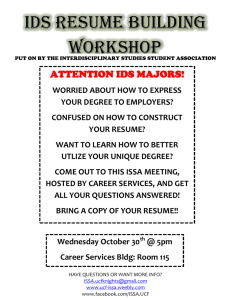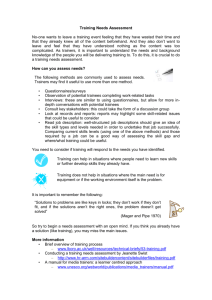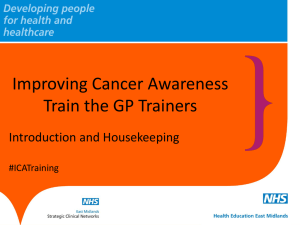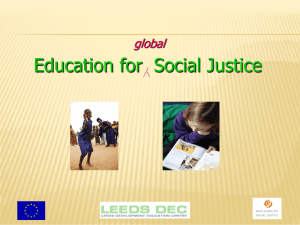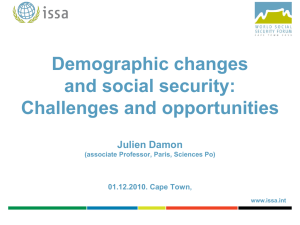Summaries of the small group discussions
advertisement
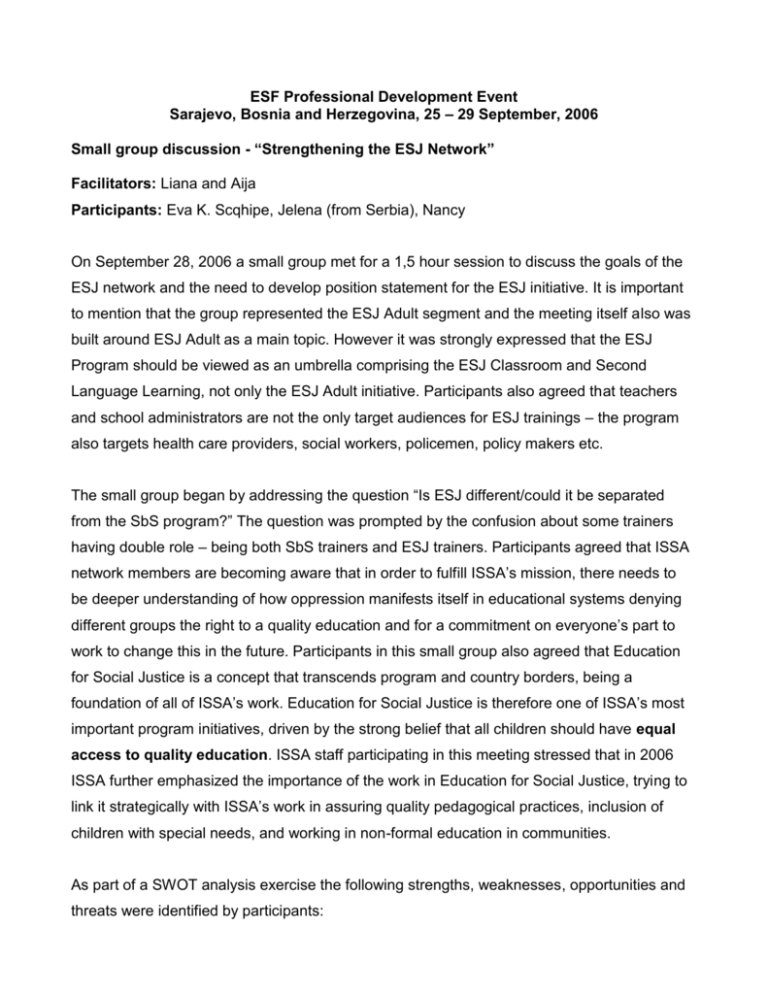
ESF Professional Development Event Sarajevo, Bosnia and Herzegovina, 25 – 29 September, 2006 Small group discussion - “Strengthening the ESJ Network” Facilitators: Liana and Aija Participants: Eva K. Scqhipe, Jelena (from Serbia), Nancy On September 28, 2006 a small group met for a 1,5 hour session to discuss the goals of the ESJ network and the need to develop position statement for the ESJ initiative. It is important to mention that the group represented the ESJ Adult segment and the meeting itself also was built around ESJ Adult as a main topic. However it was strongly expressed that the ESJ Program should be viewed as an umbrella comprising the ESJ Classroom and Second Language Learning, not only the ESJ Adult initiative. Participants also agreed that teachers and school administrators are not the only target audiences for ESJ trainings – the program also targets health care providers, social workers, policemen, policy makers etc. The small group began by addressing the question “Is ESJ different/could it be separated from the SbS program?” The question was prompted by the confusion about some trainers having double role – being both SbS trainers and ESJ trainers. Participants agreed that ISSA network members are becoming aware that in order to fulfill ISSA’s mission, there needs to be deeper understanding of how oppression manifests itself in educational systems denying different groups the right to a quality education and for a commitment on everyone’s part to work to change this in the future. Participants in this small group also agreed that Education for Social Justice is a concept that transcends program and country borders, being a foundation of all of ISSA’s work. Education for Social Justice is therefore one of ISSA’s most important program initiatives, driven by the strong belief that all children should have equal access to quality education. ISSA staff participating in this meeting stressed that in 2006 ISSA further emphasized the importance of the work in Education for Social Justice, trying to link it strategically with ISSA’s work in assuring quality pedagogical practices, inclusion of children with special needs, and working in non-formal education in communities. As part of a SWOT analysis exercise the following strengths, weaknesses, opportunities and threats were identified by participants: Strengths: ● ESJ has been implemented in many countries, there is a lot of experience ● Inclusive approach ● Combination of different, powerful resources ● Makes explicit connection with “big goals” – EFA initiative, inclusive education ● Partnerships (e. g. DECET) ● Practical applications; use what’s right for the country or region ● Communication, ongoing opportunities to meet and to receive training ● Opportunity to share, different events ● Background support, experiences ● Able to use the good reputation of ISSA as an international association; ● Social benefit for everyone ● Human capacity on different levels, different specialists working together ● Strengthening social dimension and inclusion ● Tool to support ISSA’s mission ● Program that can be applied to different target groups ● Tested “ on the ground” and revised after that – open for revision again ● Addresses issues related to the quality and equal access to education ● Sharing of knowledge and experiences; common meetings and events ● Chances to update materials based on feed-back ● Empowers individuals within and outside the schools ● Reaches out beyond schools, different target groups ● Ministries have shown interest to accredit this program ● Developed modules, trained trainers, experience of implementation in the field ● Individuals have built strong networks; many professional links and friendships ● Committed individuals ● Strong theoretical understanding along with practical application Weaknesses: ● How to support the energy and enthusiasm of trainers after the first training? ● How to measure impact? ● Lack of common understanding on what is ESJ ● Understand better who can benefit from ESJ: stakeholders and target audiences ● Need for stronger connections with other ISSA initiatives ● Need for additional funding ● There is a danger to see the program only from the political point of view ● At the same time there is need for more political support ● Outcomes are difficult to achieve and hard to measure ● Need for more minority involvement/control ● Differences between local contexts ● Need to be able to present the program differently to different target groups ● Need to use existing methods from other parts of programs and initiatives ● Need to develop stronger umbrella to encompass ESJ Adult, Classroom and SLL ● Need to have accreditation from ministries of education in all included countries ● More information about ESJ to the public (language issue, need for translations) ● Trainers - not confident or skilled enough to work with audiences outside schools ● Sustainability of: trainers, program, implementation ● ● Need to have evaluation and research tools Need to be more aware of what research has already been done and how to use it Threats: ● Global instability ● Individual and group ignorance ● Political interests Opportunities: Professional development: training and mentoring Present successes and results at conferences Long-term approach Position paper/statement: Discussions on this topic began by exploring how the ESJ position paper/statement may be useful for communication and achieving common understanding both within and outside network. Participants discussed what should be included, how it should look, who would be interested to participate in developing? Below are some of the main ideas expressed by participants: It has to be a short, powerful statement, possibly only one paragraph Key words could be: social benefit, long term approach, taking into account human dispositions, it is a process, long term vision, need for commitment to re-create it generation after generation, to inspire and urge people to think about what/how they feel The group volunteered to work together on email to draft a position statement. ISSA staff offered to take the lead on this and get in touch with the group in the near future. Communication and network: Discussion on communication and networking was especially lively and it clearly showed the existing gap between the wish to receive information and lack of time (and sometimes also motivation) to provide information. Some participants expressed the idea that not much is happening beyond the annual meeting. Ideally a real network could be developed. There were different ideas about developing and using a web site, starting from sharing information within the network and developing a monthly newsletter for the public. Purpose: ● to provide information and tips/a tool kit for trainers ● to publish experience from different countries about the implementation, practical tips and suggestions, web links where to look for materials or other resources; ● to post good modifications of activities, good handouts Suggestion - Materials in different languages could be posted on the site – some languages are used in several countries, if something seems interesting and useful, countries can look for help to translate within the country itself. Suggestions for future activities: ● To develop tips for trainers how to prepare themselves for work with different audiences ● To pay more attention to how program is being seen from the point of view of politicians ● To develop tools for assessment ● To form multidisciplinary teams: ESJ trainer + specialist for reaching audiences outside the school; ● To create a database on specialists available ● To establish links with the national curriculum – maybe through social studies ● To send in reports about main activities, including statistical information – there may be other useful information, especially in the project development stage. Reports may be used by ISSA to report to donors, applying for new grants and to inform strategy development and implementation. Numbers will be very useful: number of trainings conducted, number of teachers trained, different target audiences reached etc. Suggestion: to develop a questionnaire to identify what type of information to request in the reports. ● To post on the web some sample agendas for different program events, along with the staff agenda and important reminders ● To develop internet journal, short, bi-monthly, newsletter of ESJ with the links to other parts of the website or other important sources Application to the Third Millennium Foundation: Liana, Aija and Dawn will work on the letter of inquiry to be sent by Oct 2, 2006. Some ideas from the RE:FINE project proposal could be used. Summary of Priorities: Strengthen and consolidate the existing network and expand the ESJ initiative to new countries Ensuring common understanding about ESJ and how it could be used in a variety of ways, including linking to other ISSA intiatives To improve/ develop PR and communication outside the network Improve communication inside the network Strengthen existing partnerships, to look for new partners, experts and potential donors NEXT STEPS: To develop a questionnaire for collecting information – develop format for reports To develop position statement To enhance communication within the ESJ network by sending out a newsflash (after November) quarterly To develop an ESJ section on the ISSA site, and begin posting materials To strengthen links with other ISSA initiatives To work on new partnerships and fundraising STANDARD 7 / SMALL GROUP DISCUSSION Facilitator: Dawn Participants: Sanja Branjkovic, Iveta Nemeckova, Bozidar Nikolic, Kujtim Pacak, Sonja Rutar, Esmina Skopljak, Dawn Tankersley, Atina Tasevska This group reviewed the Standard 7 Task Force’s work on Standard 7 examples and ideas for revising the ISSA Pedagogical Standards from the viewpoint of helping practitioners understand the intent of Standard 7 on Social Inclusion. Several points were made in this discussion including: More work is needed with teachers: on development of their portfolios on how to document their work in Standard 7 as well as the other Standards. to help them put ESJ content into the different curricular areas that are specified under the national curriculums. (It should be noted that the Ministry of Education of the Czech Republic has now included multicultural competencies as a cross cutting theme in all of their content areas for students in their new school reform. Iveta will try to get a copy of this in English to share with everyone in their own work with MOEs.) to deepen their understanding that Standard 7 is NOT a tourist or celebration of holidays curriculum. With certifiers: Even though we want to provide practioners with examples of how to meet Standard 7, the point here is to improve quality and not as a check list for certification purposes. The development of good questions to help certifiers ask teaches concerning Standard 7 are needed. With systems: It was noted that in SbS classrooms where Roma assistants work with teachers, that it is much easier to meet Standard 7. The question was proposed whether other adults in the classrooms such as parent volunteers, pedagogues such as kindergarten methodologists or specialists, etc. could also help teachers in meeting Standard 7 and what needs to be added in the mentoring trainings so that they can have the same success as the Roma Assistants? Regarding revision of the ISSA Pedagogical Standards The name “Social Inclusion” is problematic both for translation and understanding the intent, and it should be changed. (However it is used in this memo until something better can be found.) Everyone was in agreement that strengthening the first 6 standards with specific language for Social Inclusion is needed so that teachers understand how Standard 7 is not an add-on, but is part of the other Standards. However, everyone was also in agreement that a separate Standard on Diversity/Social Inclusion is also needed. Report submited by Dawn Tankersley TRAINER STANDARDS/ SMALL GROUP DISCUSSION Facilitator: Zorica Participants: Melinda Petho, Julia Voros, Dimitar Bonevski, Biljana Maslovarić, Dušanka Popović and Zorica Trikić This group discussed about Trainer Standards trying to find answers to the following questions: Do we need TS Purpose of TS Content of TS/ Changes needed Ways and means for developing TS Ad 1. Do we need TS The group decided that we need TS, but not only for ESJ Trainers, since the values of ESJ should be core part of all ISSA trainings (and trainers approaches) ISSA trainers in general do not have certificates that they are trainers for different programs, so TS should be integrated part of ISSA Quality Initiative/ Assurance and applicable on the level of the whole ISSA network Why TS are especially important for ESJ initiative : ● The topic in ESJ is very sensitive/touches personal, cultural, national, emotional etc. levels) ● After this kind of trainings(especially ESJ A)it is very difficult to measure outcomes so it is important to ensure high quality of input (training and trainers) Ad 2. Concerning purpose of TS group agreed that TS should be used: as ISSA position statement on quality trainers practice as quality protection(program, training, trainers) since certified trainers and efficient TS can be added value on “educational market” as protection of specific programs(especially ESJ), like “ Only we can do it in a right way” as PR for programs to promote professional development for trainers for mentoring process and professional support for levelling quality of training and trainers in the network for internetwork professional support and exchange of trainers, defining which trainers can work on the national and international level as a self evaluation instrument Ad 3. Content of TS/ Changes needed The group liked the structure of TS drafted in 2003. They would like to keep structure which is covering 4 categories, knowledge, skills, attitudes and ethics, but are aware that deep revision of TS is required. Some proposed revisions include: ● Language needs to be clear and specific, indicators should be measurable ● The TS should be simply and easy to apply(!?) ● The TS should consist of one general part, which covers basic trainer's knowledge, skills, attitudes and ethics, and as additional part can have specific knowledge, skills, attitudes and ethics referring to different programs ● The introduction part should be developed in a different way including general ISSA position statement, ISSA professional ethic statement, theoretical part covering basic principles of adult learning ● It would be necessary to define appropriate educational background and professional development process for ISSA trainers Some dilemmas and questions emerged like: ● should it be check list for self assessment, or standards with rating system as it is proposed ● do those two options exclude each other, can we keep format of “ regular standards” and add check list which will promote self-assessment ● how to make clear distinctions between knowledge, skills, attitudes and ethics ● how to measure attitudes and ethics Concerning content of TS, group decided to do brainstorming and to make a list of potential indicators (we did not have time to divide them in 4 categories or to discuss the level of their generality, or to decide are these really potential indicators or examples, but we decided to share it with you. So these are proposed indicators: ● knows how to create safe and confidential atmosphere and environment ● has mediation/conflict managment skills ● has emphaty for individuals and group ● has sensitivity for dynamic of group process ● has knowledge for local context(culture, tradition, current situation) ● has non-judgemental attitude ● has openness for diversity ● has knowledge of policy documents(international and local) ● approaches participants and every situation with open minds/ shows openness for any kind of participant's feedback ● knows how to connect theory with activities and local context ● before the training has good preparation(including learning about specific context) ● has skills for good time management and planing ● has good sense of humour ● ready to do a lot of self work ● has high level of self awareness(needs, feelings, thoughts, biases) ● do on regular basic selfassesment, self evaluation and self reflection ● keeps quality documentation, records ● shows respect for participants, their background, attitudes, reactions... ● advocate for the rights of marginalized groups Group agreed that additional, supporting tools and resources should follow, like developed, uniform ways of self evaluation(Hungarian team has developed very good tool), portfolio etc. Ad 4. Ways and means for developing TS Group agreed with next steps proposed by Standard 7 Task Force to engage Council Members at the October 2006 meeting in short discussion about TS. Group believes that inside ISSA we have enough expertise to create TS, and that we are going to need them very soon, since in some countries the process for applying to the open competition for doing training for programs started (for example situation in Hungary)and we believe that certification of ISSA trainers will protect trainers as well as ISSA programs. Report submitted by Zorica Trikić
